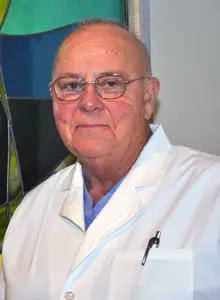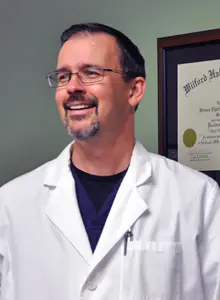Oral Surgery
Oral surgery refers to any surgical procedure that involves the mouth, gums, teeth, or jawbone. These procedures are typically more complex than routine dental treatments like fillings or cleanings and may require sedation or anesthesia. Oral surgery is often necessary for patients who have specific dental health concerns that cannot be treated with non-surgical interventions.
Some common reasons patients seek oral surgery include:
- Severe tooth decay or damage
- Periodontal (gum) disease
- Impacted or problematic wisdom teeth
- Bone loss or insufficient bone structure for dental implants
- Cosmetic issues related to the teeth, gums, or jaw
At San Antonio Periodontics & Implants, Dr. Maller uses the latest technology and techniques to perform oral surgeries with precision, minimal discomfort, and optimal outcomes.
Common Oral Surgery Procedures in San Antonio, TX
Tooth Extractions
Tooth extractions are among the most common oral surgery procedures. While most patients aim to preserve their natural teeth, certain situations may necessitate the removal of a tooth to maintain overall oral health.
Why Are Tooth Extractions Needed?
Tooth extractions are often necessary for the following reasons:
- Severe Tooth Decay or Damage: If a tooth is severely decayed, cracked, or damaged beyond repair, extraction may be required to prevent infection and further damage.
- Periodontal Disease: Advanced gum disease can cause the gums and bone around a tooth to weaken, resulting in the need for extraction.
- Overcrowding: In some cases, extra teeth may need to be removed to create space for orthodontic treatment.
- Impacted Teeth: Teeth that are trapped beneath the gums (such as impacted wisdom teeth) may require extraction to prevent pain and infection.
The Tooth Extraction Procedure
Before the extraction, Dr. Maller will carefully evaluate the tooth, surrounding tissues, and the overall health of your mouth. Depending on the complexity of the extraction, local anesthesia or sedation will be administered to ensure that you are comfortable during the procedure. After numbing the area, Dr. Maller will gently remove the tooth and, if necessary, stitch the area closed to promote healing.
Recovery After Tooth Extractions
Post-surgical care is essential to ensure proper healing after a tooth extraction. Dr. Maller will provide you with detailed instructions on how to care for the extraction site, manage discomfort, and promote healing. Common recommendations include:
- Avoiding hard or crunchy foods
- Keeping the area clean
- Taking prescribed medications for pain management
Wisdom Tooth Removal
Wisdom teeth are the third set of molars located at the back of the mouth. These teeth often appear in late adolescence or early adulthood and can cause a variety of problems if there isn't enough room in the jaw for them to emerge properly.
Why Are Wisdom Teeth Removed?
While some people may have no issues with their wisdom teeth, many experience complications, including:
- Impacted Wisdom Teeth: If a wisdom tooth doesn't fully emerge from the gums, it may become impacted, leading to pain, swelling, and infection.
- Crowding of Other Teeth: Wisdom teeth can push against neighboring teeth, causing overcrowding and misalignment.
- Infection or Gum Disease: Wisdom teeth that are partially erupted can create pockets in the gums that trap food and bacteria, leading to infection or gum disease.
The Wisdom Tooth Removal Procedure
Dr. Maller will assess the position of your wisdom teeth through X-rays and a clinical exam to determine if removal is necessary. If extraction is required, the procedure typically involves local anesthesia or sedation, depending on the complexity of the removal. Dr. Maller will carefully remove the wisdom teeth and may use stitches to close the gum tissue.
Recovery After Wisdom Tooth Removal
Following wisdom tooth extraction, it's common to experience swelling, bruising, and some discomfort. Dr. Maller will provide post-operative care instructions, which may include:
- Applying ice packs to reduce swelling
- Taking pain relievers as prescribed
- Following a soft food diet to avoid irritating the surgical site
Most patients recover from wisdom tooth removal in a few days, but full recovery may take up to a couple of weeks.
Bone Grafting
Bone grafting is an essential oral surgery procedure for patients with insufficient bone structure to support dental implants or other restorative treatments. Bone loss can occur due to tooth loss, gum disease, or trauma, and it is often necessary to restore bone volume before dental implants can be placed. Contact us to learn more.
What is Bone Grafting?
Bone grafting involves adding bone material to areas of the jaw that have experienced bone loss. The bone material may come from the patient's own body (autograft), a donor (allograft), or synthetic materials (xenograft). The graft serves as a foundation for new bone growth, allowing the area to support dental implants and restore normal function and appearance.
The Bone Grafting Procedure
During the bone grafting procedure, Dr. Maller will make a small incision in the gum to access the underlying bone. The graft material will be placed in the targeted area, and the incision will be closed with sutures. Over time, the grafted bone will fuse with the existing bone, providing a stable base for dental implants or other restorative treatments.
Recovery After Bone Grafting
Recovery from bone grafting varies depending on the extent of the graft. Dr. Maller will provide instructions to ensure optimal healing, including:
- Avoiding hard foods or excessive chewing
- Keeping the area clean
- Taking medications as prescribed for pain management
Bone grafting recovery typically takes several months, but it is a crucial step for ensuring the success of dental implants and other advanced dental treatments.
Dental Implants
Dental implants are a revolutionary solution for replacing missing teeth, and they require oral surgery for placement. Unlike traditional dentures or bridges, dental implants replace both the tooth root and the crown, providing a permanent, natural-looking solution.
What Are Dental Implants?
Dental implants consist of a titanium post that is surgically placed into the jawbone, where it fuses with the bone through a process called osseointegration. Once the implant is securely in place, a crown, bridge, or denture is attached to complete the restoration.
The Dental Implant Procedure
Dr. Maller will begin by assessing the health of your gums and jawbone to determine if you are a candidate for dental implants. If necessary, bone grafting or other preparatory procedures may be performed to ensure that there is enough bone for the implant. During the implant procedure, a small incision will be made in the gum, and the titanium post will be inserted into the jawbone. After several months of healing, the post will fuse with the bone, and a crown will be placed on top.
Recovery After Dental Implants
After the dental implant procedure, patients may experience some swelling, discomfort, and bruising. Dr. Maller will provide detailed instructions on how to care for the surgical site and manage any discomfort. Most patients can resume normal activities within a few days, but full integration of the implant can take several months.
Treatment of Periodontal (Gum) Disease
Advanced gum disease, or periodontitis, often requires surgical intervention to restore gum health and prevent tooth loss. Periodontal surgery is used to treat severe cases of gum disease by removing infected tissue, reshaping the gums, or grafting tissue to restore lost gum volume.
What Is Periodontal Surgery?
Periodontal surgery may involve several techniques, including flap surgery, bone grafting, or tissue grafting. The goal is to remove infected tissue, repair the damage caused by gum disease, and restore healthy gum tissue to support the teeth.
The Periodontal Surgery Procedure
Dr. Maller will perform periodontal surgery under local anesthesia, making small incisions to access the infected areas of the gums. In some cases, bone grafting or tissue grafting may be required to restore lost gum or bone tissue. Once the procedure is complete, the gum tissue will be carefully sutured, and the area will heal over time.
Recovery After Periodontal Surgery
Post-surgical recovery may involve some swelling and discomfort, which can be managed with prescribed medications. Our periodontist in San Antonio, TX, will provide you with specific instructions on how to care for your gums during the healing process to ensure the best possible outcome.
Conclusion
Oral surgery is a vital component of comprehensive dental care, addressing everything from tooth extractions and wisdom teeth removal to complex procedures like dental implants and bone grafting. At San Antonio Periodontics & Implants, Dr. Steven C. Maller, DDS, MS, combines advanced surgical techniques with personalized care to provide patients with effective and lasting solutions to their dental concerns. Whether you're in need of routine tooth extractions or more complex procedures, you can trust Dr. Maller and his team to help you achieve a healthy, beautiful smile. Contact San Antonio Periodontics & Implants today to schedule a consultation and take the first step toward optimal oral health and function.
Take the first step toward optimal oral health and a confident smile. Contact Dr. Steven C. Maller, DDS, MS, at San Antonio Periodontics & Implants for expert care tailored to your needs. Call us at (210) 824-0111 or visit us at 4501 McCullough Suite 104, San Antonio, TX 78212. Your healthiest smile starts here!
Visit Our Office
Office Hours
- MON - THU8:00 am - 4:00 pm
- FRI8:00 am - 12:00 pm
- SAT - SUNClosed


